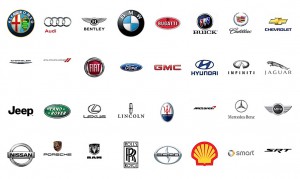New vehicle buyers are visiting dealership in droves these days, and more often than not, they’re sticking with the brand that brought them there, according to a new study.
IHS Automotive reports that brand loyalty among new car buyers is up to 52.8% in the first quarter of this year with several makes enjoying new high-water marks for loyalty, including Chevrolet, GMC, Infiniti, Jeep, Land Rover, Lexus, Lincoln, Mazda, Mitsubishi, Nissan, Porsche, Subaru and Volvo.
New vehicle sales in the U.S. through May are tracking for sales in excess of 17 million units in 2015 and June sales are only expected to continue the trend, according to Alec Gutierrez, senior analyst, Kelley Blue Book.
Gutierrez said the expected 1.5 million vehicles sold this month will bring the first-half of 2015 totals to 8.53 million, a 4.7% increase from the same time last year and the highest first-half since 2005.
The loyalty numbers can be tied to a few reasons, chief among them: choice. Brands are offering buyers more choices than they have in the past.
“The increased number of different models within brands makes it easier for households that may need a different type of vehicle to maintain their loyalty,” said Tom Libby, manager of automotive loyalty and industry analysts, IHS Automotive.
“In addition, the increased popularity of leasing since the downturn has helped significantly as lessees are consistently more brand loyal compared to retail owners.”
The number of models available in the U.S. market increased by 12% from 2005 to 2015, driven by major increases at several luxury brands. Customers returning to market now have a greater number of choices at the brand from which they purchased their original vehicle, increasing the probability they will remain brand loyal.
(June auto sales heating up the record books. For more, Click Here.)
Two other factors are playing a role in the increase in brand loyalty: the rise in leasing and the drop in the number of shoppers from discontinued brands. Leasing rebounded from its decade low of 13.9% of the market in 2005 to 22.5% of the market so far in 2015: a nearly 62% increase. Those who lease vehicle tend to be more loyal because they get better deals that lower their monthly payments.
(Click Here for details about how important car ownership is to millennials.)
Several years ago as some makers began shutting down brands like Saturn, Mercury and Pontiac, those buyers had no choice but to be “disloyal.” They switched because they had no choice, driving up earlier numbers. Now many of those who switched are on their next round of buying and are staying with their current choices, IHS reported.
(Drone delivery? Younger motorists want big changes in auto sales process. Click Here for more.)
Other contributors to higher loyalty rates include improved new vehicle quality, which is keeping consumers happy with their vehicle choice over time, implying higher loyalty and lower defection rates. Marketers also are aware that it is more cost effective to retain a customer than to conquest one, and therefore OEMs are placing a greater focus on loyalty and customer satisfaction over time.


No brand loyalty when mfr. abandons market segment I want to remain with . I am a Dodge owner / sales since 1966 . I need to replace 2005 Magnum AWD @ 321,000 trouble free km’s . Chrysler never told market awd was available and salesmen too lazy to sell to Canadian winter needs . No ads to let consumer know that configuration was avail – a car based awd for ride comfort and wagon for utility and extra load space , with better fuel economy. We own a Jeep Gr Cherokee , so don’t want / need a SUV or Hockey team Mom crossover like a Journey.Will have to buy a Venza , Volvo or Audi – all offer that configuration . FCA has abandoned me ! Loyalty – NOT !
I am loyal to a point. I always try to buy American Owned- & America-made vehicles. Then highest % made in America-made vehicles.
If it comes from Mexico, China, Korea or Japan, where ever, Not interested.
Must be made here. I am not interested in GM or Ford imports.
Or anyone else’s imports.